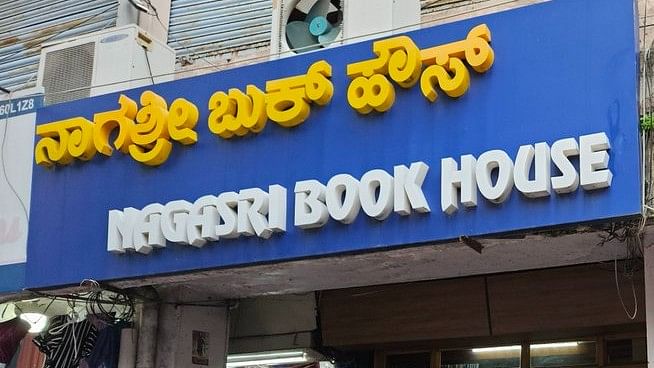
Nagasri Book House.
Credit: X/@hsraghav
Earlier this month, I heard that Nagasri Book House, a landmark at the Jayanagar 4th Block Shopping Complex, is going to be closed. Dismayed and devastated, I could not help but recount its magnificent contribution to my life—intellectually and otherwise.
No birthday, anniversary, school term, or special occasion was complete without a visit to Nagasri, and when friends from outside the city visited us, the bookhouse was a mandatory visit. It was the best that Bangalore had to offer! While its four small walls might seem like any other cosy bookshop to an outsider, a local knows the multitudes those shelves hold.
Having lived through different phases of the development of the shopping complex, Nagasri presents itself as an archive of Jayanagar itself and its changes through the years. Nagasri also stands as a record for my life, bearing testament to the different sections of the store that I gravitated towards as I grew up. While my early adolescent years held a close and abiding interest in the comic book section, my teenage years were spent trying to find young adult literature on World War II. Growing older, I found myself ‘across the aisle,’ on the opposite side shelf, with books on politics, history, and literature.
Anti-colonial thinker Alice Te Punga writes that book shelves are political and full of possibilities. They hold a lens into how we see the world, how we make knowledge, how we relate to one another, and how we imagine new tomorrows. The arrangement of the book display and shelves at Nagasri was closely attuned to this politics. The display always consisted of an eclectic amalgam of Kannada and English literature, spanning from recipe books to cultural commentaries and sports biographies. Surely, one could find the latest fantasy fiction novel seated right beside a collection of Kabir’s anti-caste poetry. What set this display apart was its commitment to diversity, to small and big publishing houses alike, to old and to new.
Unlike larger commercial bookstore chains, the attention, care, and detail that went into curating bookshelves at Nagasri always amazed me. Later in my life, when I visited famed bookstores like Bahrisons Booksellers at Khan Market in Delhi, I yearned for the simple seriousness with which books were arranged at Nagasri.
My first encounter with non-communalised historical writing was made at Nagasri, when my sister and I purchased our prized copy of Subhadra Sen Gupta’s Let’s Go Time Travelling! which positioned the Marathas and Mughals in unemotional and rather humorous terms. As little children, we came back home with rare collectibles of Indian children’s fiction, including The Deadly Royal Recipe by Ranjit Lal, a thrilling tale about how a band of children tries to trick a greedy king with a secret recipe book, and Niveditha Subramaniam and Sowmya Rajendran’s “Mayil will Not Be Quiet,” about a gutsy little girl who asks fiery questions about mothers, onions, and the Ramayana. It is undeniable that Nagasri played an important part in sustaining provocative and progressive literature by giving space to these beautiful publications on its shelves. In turn, these books gave me a lease of life—a way to see the world and think about justice.
Nagasri Book House played a defining role in helping me think of the idea of care. It was a place where family and friends went to spend time and unwind. But it was not without the able watch of Venkatesh uncle and Prasad uncle, who would search high and low for books that we made demands for. I remember when my mother received a call weeks after a book request, when they had finally found Shabnam Minwalla’s The Six Spellmakers of Dorabji Street, which apparently had taken several days to trace!
In another instance, one summer, my sister and I decided to pop by the store to bring back books for the next term at school. Lo and behold, we were informed at the cash register that copies of Animal Farm and To Sir, With Love had already been purchased by our mother about an hour ago! We spent the rest of the afternoon browsing and rummaging, relieved from the one chore that we had come to complete! It was that characteristic Nagasri eye—watchful, so we did not have to!
This personal connection is perhaps the tip of the iceberg of what Nagasri Book House offers. The impersonal and de-politicised book shops that sell flashy new releases can’t come close to the intimacies forged here. Every time I turn the corner and smell the cooking popcorn, gobi manchurian, and masala puri around the side of the store, the unforgettable memories of the stacked shelves of Nagasri Book House will always stand to greet me.
(The writer is a law graduate interested in local histories and people’s movements)